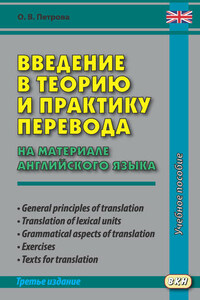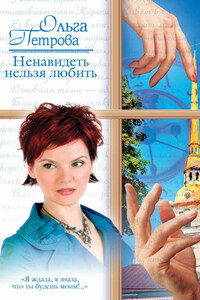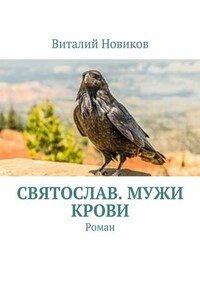МИНИСТЕРСТВО ОБРАЗОВАНИЯ И НАУКИ РОССИЙСКОЙ ФЕДЕРАЦИИ
ФЕДЕРАЛЬНОЕ ГОСУДАРСТВЕННОЕ БЮДЖЕТНОЕ ОБРАЗОВАТЕЛЬНОЕ УЧРЕЖДЕНИЕ ВЫСШЕГО ПРОФЕССИОНАЛЬНОГО ОБРАЗОВАНИЯ «НИЖЕГОРОДСКИЙ ГОСУДАРСТВЕННЫЙ ЛИНГВИСТИЧЕСКИЙ УНИВЕРСИТЕТ ИМ. Н. А. ДОБРОЛЮБОВА»
Рекомендовано Учебно-методическим объединением по образованию в области лингвистики Министерства образования Российской Федерации в качестве учебного пособия для студентов вузов,обучающихся по специальности «Перевод и переводоведение»
Рецензенты
Литвин Ф. А.–докт. филол. наук, профессор (Орловский государственный университет)
Лаврова А. Н.–докт. филол. наук, профессор (Нижегородский государственный технический университет)
Ответственный редактор
Ивашкин М. П.–докт. филол. наук, профессор
© О. В. Петрова, 2016
© ООО «Издательство ВКН», 2016
General principles of translation
Translation is a process and the result of turning a text from one language into another, which means expressing the same by the signs of a different language. Bearing in mind that every sign has two planes (plane of expression and plane of content) the essence of translation could be described as changing the elements of the plane of expression while the plane of content remains constant.
The language of the original text is called "source language", the language into which the text is translated is called "target language" (the corresponding Russian terms are "исходный язык" and "переводящий язык").
One of the main difficulties of translating lies in the fact that the meaning of the whole text is not exhausted by the sum of meanings of its elements. The meaning of a text is made up by words (characterized by their denotative and connotative meanings and stylistic reference), syntactic meaning of sentences and utterances larger than sentences, suprasegmental elements and lexico-semantic connections between words and phrases.
Every language is characterized by a specific structure of its lexico-grammatical fields and has its own lexical, morphological and syntactic systems. It may result in lack of coincidence between the means of expressing the same content in SL (source language) and TL (target language).
That is why good practical knowledge of the two languages is quite necessary but not sufficient for translating. Besides this knowledge one must possess a number of skills and be guided by a number of principles worked out by the theory of translation. These principles are connected both with linguistic and extralinguistic aspects.
While translating one must keep in view typological characteristics of both the languages and remember that the same idea may be expressed lexically in one of them and grammatically in the other. To illustrate this let us compare the ways of expressing priority in English and in Russian.
The actor, Gilbert Caster, who had been "out" for six months, emerged from his east-coast seaside lodging about noon in the day, after the opening of "Shooting the Rapids", on tour, in which he was playing Dr Dominick in the last act.
(J.Galsworthy)
It is clear from the sentence that the period of Caster’s being "out" was prior to the moment when he "emerged from his… lodging", this priority is expressed by the Past Perfect form "had been". Now that he was playing Dr Dominick he was no longer "out". In Russian, however, it is impossible to render this idea using grammatical means only. The phrase "он был без работы" does not contain any indications to priority of this state. Hence the necessity of introducing additional lexical units conveying the meaning of the English grammatical form:
Актер Гилберт Кейстер, который перед этим шесть месяцев был без работы, …
Concrete ways and means of overcoming such difficulties depend on the structural peculiarities of SL and TL, therefore when translating one must employ one’s theoretical knowledge of phonetic, morphological, lexical and syntactic systems of the two languages.
Besides purely linguistic difficulties, translation involves a great number of problems caused by numerous extralinguistic factors. The content of any text is based upon extralinguistic reality, the text itself reflects the cultural background of the author and of the whole people speaking the language, it also reflects the history of the people, their habits and traditions, a peculiar national way of thinking, etc. All these things should necessarily be taken into consideration in order to translate the text adequately. One must know much more than the lexical meaning of the words to translate the following:
"What will you have?" he asked me. I looked at him doubtfully. Prohibition was in force and to all appearance the ship was bone-dry.
(S.Maugham)
First of all it is necessary to know that the formula "What will you have?" has a conventional meaning of an invitation to choose some liquor. Besides one should know what "Prohibition" is meant here (the eighteenth amendment to the US Constitution) not to translate it as "запрет". Only in this case there may appear a correct version:
"Что Вы будете пить?", спросил он. Я посмотрел на него с недоверием: сухой закон был в силе, и на корабле, судя по всему, не было ни капли спиртного.
It is also most essential to remember that nations speaking different languages have different experience, and things naturally known to one nation are quite unknown to another. To see it one may try to translate into English the title of the film "Петровка, 38", making it as informative for Englishmen or Americans as it is for us because we know perfectly well what office is situated there.
One of the main demands upon a person translating any text is that they should be well acquainted with its subject matter. It certainly requires some knowledge of physics to decide if the word "power" in a particular context means "сила" or "мощность", which is not the same thing.
If all these principles are taken into consideration there will be no danger of so-called "literal" translation, which means a word-for-word translation. This type of translation with all its seeming accuracy ignores both linguistic and extralinguistic factors discussed above. It leads to preserving the meanings of separate words and at the same time it distorts the meaning of the whole text (or sentence), thus often creating an undesirable comic effect. The reader is sure to be surprised at such a sentence:
…в гостиной стояли одиннадцать кресел, диван, три столика, две этажерки, …и часть большого рояля.
The phrase "part of a large grand piano" does not mean that the grand piano was divided into parts, just as the Russian expression "четверть скрипки", denoting a special little violin for children, does not mean that the violin is broken into four parts. So the phrase should be translated as "небольшой рояль", which differs from "part of a large grand piano" in structure, but conveys the same meaning.





